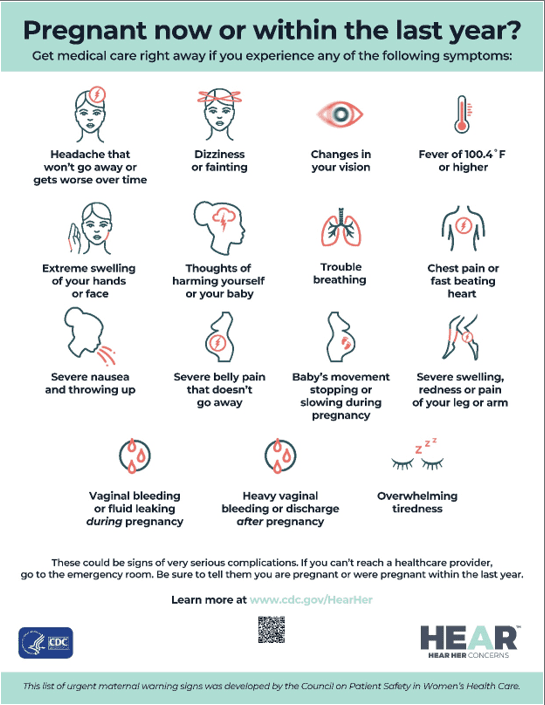
Warning Signs in Pregnancy: A Comprehensive Guide
Pregnancy is a time of joy and anticipation, but it is also important to be aware of the warning signs that could indicate a problem. By knowing what to look for, you can help ensure a healthy pregnancy for both you and your baby.
First Trimester Warning Signs
- Vaginal bleeding: Any vaginal bleeding during pregnancy is a warning sign and should be evaluated by a doctor. It could be a sign of miscarriage, ectopic pregnancy, or other complications.
- Severe abdominal pain: Sudden, severe abdominal pain can be a sign of an ectopic pregnancy, which occurs when the fertilized egg implants outside the uterus. This is a medical emergency and requires immediate treatment.
- Nausea and vomiting: While some nausea and vomiting is common in early pregnancy, excessive or persistent nausea and vomiting can be a sign of hyperemesis gravidarum, a condition that can lead to dehydration and electrolyte imbalances.
- Fever: A fever of 100.4 degrees Fahrenheit or higher during pregnancy can be a sign of infection. It is important to see a doctor to determine the cause and receive appropriate treatment.
- Chills: Chills accompanied by a fever can be a sign of an infection.
- Dizziness or fainting: Dizziness or fainting during pregnancy can be a sign of low blood pressure or anemia.
- Blurred vision: Blurred vision can be a sign of preeclampsia, a serious condition that can develop during pregnancy.
- Headaches: Severe or persistent headaches can be a sign of preeclampsia or other complications.
- Swelling: Excessive swelling in the hands, feet, or face can be a sign of preeclampsia.
Second Trimester Warning Signs
- Vaginal bleeding: Any vaginal bleeding during the second trimester is a warning sign and should be evaluated by a doctor. It could be a sign of placental abruption, a condition in which the placenta separates from the uterus.
- Abdominal pain: Severe or persistent abdominal pain can be a sign of preterm labor or other complications.
- Premature contractions: Contractions that occur before 37 weeks of pregnancy are considered premature and can be a sign of preterm labor.
- Leaking amniotic fluid: Amniotic fluid is the fluid that surrounds the baby in the uterus. Leaking amniotic fluid can be a sign of a ruptured membrane, which can lead to infection.
- Reduced fetal movement: A decrease in fetal movement can be a sign of fetal distress.
- High blood pressure: High blood pressure during pregnancy can be a sign of preeclampsia.
- Protein in the urine: Protein in the urine during pregnancy can be a sign of preeclampsia.
- Swelling: Excessive swelling in the hands, feet, or face can be a sign of preeclampsia.
Third Trimester Warning Signs
- Vaginal bleeding: Any vaginal bleeding during the third trimester is a warning sign and should be evaluated by a doctor. It could be a sign of placental abruption or other complications.
- Abdominal pain: Severe or persistent abdominal pain can be a sign of preterm labor or other complications.
- Premature contractions: Contractions that occur before 37 weeks of pregnancy are considered premature and can be a sign of preterm labor.
- Leaking amniotic fluid: Amniotic fluid is the fluid that surrounds the baby in the uterus. Leaking amniotic fluid can be a sign of a ruptured membrane, which can lead to infection.
- Reduced fetal movement: A decrease in fetal movement can be a sign of fetal distress.
- High blood pressure: High blood pressure during pregnancy can be a sign of preeclampsia.
- Protein in the urine: Protein in the urine during pregnancy can be a sign of preeclampsia.
- Swelling: Excessive swelling in the hands, feet, or face can be a sign of preeclampsia.
- Headaches: Severe or persistent headaches can be a sign of preeclampsia or other complications.
- Visual disturbances: Visual disturbances, such as blurred vision or seeing spots, can be a sign of preeclampsia.
- Epigastric pain: Epigastric pain, which is pain in the upper abdomen, can be a sign of preeclampsia.
When to Seek Medical Attention
If you experience any of the warning signs listed above, it is important to seek medical attention immediately. These signs could indicate a serious complication that requires prompt treatment.
Prevention
While not all pregnancy complications can be prevented, there are some things you can do to reduce your risk:
- Get regular prenatal care.
- Follow your doctor’s instructions for diet and exercise.
- Avoid smoking, alcohol, and illegal drugs.
- Manage any underlying medical conditions, such as diabetes or high blood pressure.
Conclusion
Pregnancy is a time of joy and anticipation, but it is also important to be aware of the warning signs that could indicate a problem. By knowing what to look for, you can help ensure a healthy pregnancy for both you and your baby. If you experience any of the warning signs listed above, it is important to seek medical attention immediately.